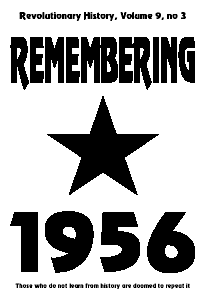Tuesday, November 28, 2006
The scene the function room of an anonymous nondescript north London pub, the purpose of the meeting I was attending the AGM of Revolutionary History journal. Arriving after the meeting had begun I took a seat at the back of the not quite full room and studied my fellow attendees. What first struck me was the continuity of purpose which was represented in that room and I was reminded of the possibility that the rather frayed thread in question is near to breaking point.
The continuity of the thread in question, that is to say the struggle for the social revolution and workers’ power, was most in evidence at the front of the room where Mildred Gordon, once a Labour Party MP, and George and Sheila Leslie, were to be found all three having been youthful members of the Revolutionary Communist Party back in the 1940’s. Near by sat Esther Leslie, the daughter of the aforementioned Leslies and one of the few intellectuals with anything to say who can be found in the ranks of the 'revolutionary left' today, in her case the Socialist Workers Party. Bob Archer the son of another old time Trotskyist, the late John Archer, was to be found a few seats away he too remains a member of a far left group although it is so minuscule I forget its name.
As for the rest of the audience it consisted of former and current members of the various Trotskyist groups and ranged in age from retirement age to the relatively youthful elements only just in their forties. Although for one brief moment a comrade only just in his twenties was present it must be said. Apart from being ancient the audience, with the exception of those already mentioned, was also uniformly male, grey of hair and lacking in any fashion sense. But to be fair is it wise to expect socialists for whom the history of a small temporarily defeated movement is a passion to be other than greybeards? Well, yes it is, but more of that later.
The first section of the meeting consisted of business items and was, as is often the case with such things, rather dull but quite important. Opening the meeting Ted Crawford noted that the journal had signed a distribution deal with Merlin http://www.merlinpress.co.uk/acatalog/index.html which should increase sales of both the current and back issues. It may be of interest to many that said company have recently published Broue’s monumental volume on the German Revolution and will be reprinting the ABC of Communism by Bukharin and Preobrazhensky in the spring. Given that the finances of the journal are healthy, if not vigorous, this cannot but be good news for students of the past of the revolutionary movement. Also noted was the refurbishment of the journals web http://www.revolutionary-history.co.uk/ site which features a wide range of materials some of which has not appeared in print. More controversially a reorganisation of the journals editorial board was also mooted by the core of the active London based members of the board.
Originally set up by Sam Bornstein and Al Richardson, following their jointly writing a two volume history of British Trotskyism from its beginnings to the dissolution of the RCP in the late forties, the object of the journal was clearly oriented on making available rare texts from the international Trotskyist movement and supporting them with historical essays placing them in context. Such a remit ensured that the early editorial board consisted of a levy of comrades drawn from the ranks of those comrades outside the groups for various reasons leavened by informal representatives of the then current groups identifying with the Bolshevik Leninist legacy. As time passed this was modified by the addition of other comrades who did not always identify with the Trotskyist tradition and, somewhat inevitable this, the Spartacists threw a wobbly and walked away from the journal. More recently, particularly since the death of Al Richardson, small groups of comrades have worked collectively to bring together individual issues.
The main thing was that the journal worked and came out regularly with an ever widening range of material and interests but was always informed by its starting point of recording and documenting the history of the revolutionary communist movement. But unless more comrades come forward to participate in the work of the journal, particularly on the technical side of things, there is a threat that the on going project of uncovering the true history of the revolutionary movement and making it available to the radical public will be endangered given the inevitable aging process. Should comrades be interested in helping the journal, particularly in relation to taking charge of important technical work such as layout and translation, they ought not hesitate contacting the journal directly or via this blog.
The second part of the meeting was devoted to a talk by Mike Jones, who has done much to make known the record and views of the Brandler-Thalheimer tendency in this country, on Pierre Broue and the German Revolution. An extended discussion of the talk would be superfluous given that it duplicated Mike’s illuminating review of Broue’s monumental work which can be found in the current issue of Revolutionary History. What must be said however is that the discussion from the floor, although a little unfocussed, was of a high standard and would have been of considerable benefit to many young comrades only a few years in the revolutionary movement. And yet with only a single solitary exception no such comrades were present a result of the group culture that prefers not to expose their more youthful members to the possibility of being corrupted by non-orthodox opinions. Such attitudes will and are condemning the groups to irrelevance and a decline into an intellectual stupor that makes the Catholic Church of the Middle Ages look progressive by comparison.
Labels: Hungary, Revolutionary Archive, Trotskyism
